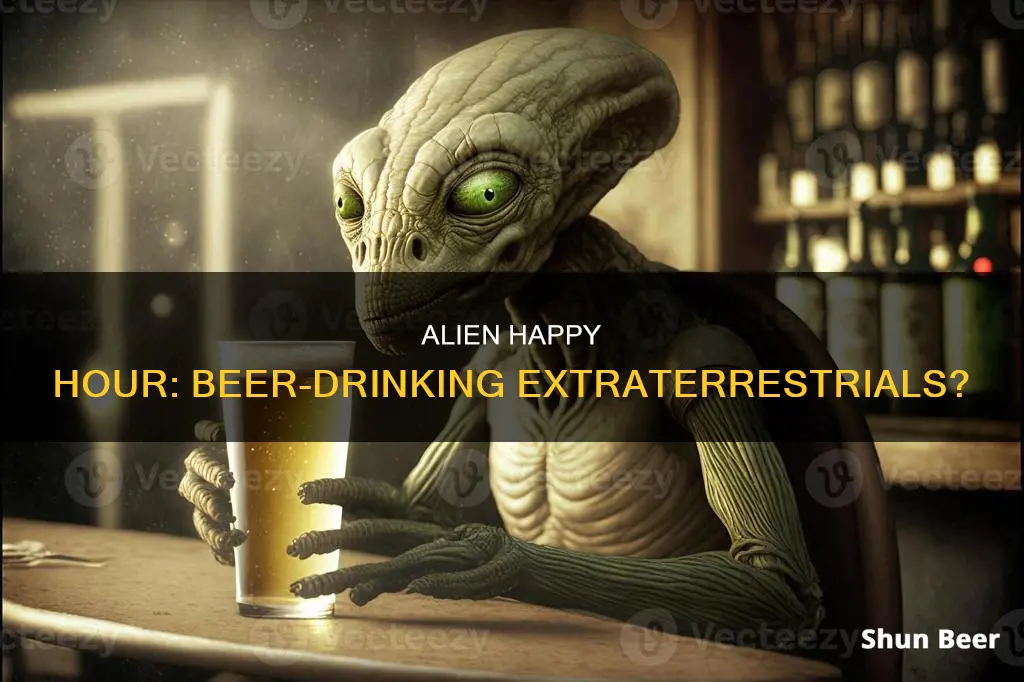
The idea of aliens drinking beer has been explored in popular culture, with references in films such as *E.T. the Extra-Terrestrial* and *Howard the Duck*. While these depictions are fictional, they raise an interesting question: could aliens consume alcoholic beverages?
In reality, the topic of alcohol in space has been a subject of discussion and regulation. Government agencies that send astronauts to space stations like the International Space Station (ISS) generally prohibit the consumption of alcoholic beverages. This is due to concerns about the impact of alcohol on the performance and safety of astronauts, as well as potential issues with the water recovery system and equipment damage.
However, there have been exceptions and experiments related to alcohol in space. For example, Buzz Aldrin consumed wine on the moon during the Apollo 11 mission, and cosmonauts on the Russian Mir Space Station were allowed small amounts of cognac and vodka. Additionally, experiments have been conducted on the ISS to study the effects of microgravity on the aging process of alcoholic beverages.
So, while there are no known instances of aliens drinking beer, the topic of alcohol consumption in space, by humans or potential extraterrestrial beings, remains a subject of fascination and regulation.
| Characteristics | Values |
|---|---|
| Could aliens drink beer? | It depends on the alien, but probably yes. |
| Are there any examples of aliens drinking beer in popular culture? | Yes, E.T. in E.T. the Extra-Terrestrial (1982), Howard the Duck in Howard the Duck (1986), and Mac in Mac and Me (1988) are all depicted drinking beer. |
| Is beer consumed in space? | Yes, but it is prohibited on the International Space Station due to the impact of alcohol on the station's water recovery system. |
| Has beer ever been considered for consumption on space missions? | Yes, during the Skylab programme, but it did not test well on zero-G flights. |
What You'll Learn

Alcohol in space: the history of booze in orbit
Alcohol has been consumed in space since the early days of the Soviet space program. While NASA has generally been stricter about alcohol consumption, both organisations have allowed it at certain points in history.
In the 1970s, NASA's Charles Bourland planned to send sherry with the astronauts visiting Skylab, but the idea was scrapped because the smell was found to induce a gag reflex in zero-gravity flight tests, and there was ambivalence among the astronauts. The Russian state media, Russia Beyond, says drinking has been officially banned, but the first alcoholic drink sent into space by cosmonauts was a bottle of cognac, taken to the Salyut 7 in 1984. Cosmonauts aboard Mir were also allowed alcoholic drinks, including cognac, vodka, and "ginseng liqueur", supposedly for health reasons.
In 1969, Apollo 11 astronaut Buzz Aldrin drank wine when he took communion on the Moon in the Lunar Module Eagle. This ceremony was not broadcast following protests against religious activity.
In 1985, a NASA report titled "Living Aloft: Human Requirements for Extended Spaceflight" considered the pros and cons of drinking on space flights and in future settlements. It noted that alcohol was unlikely to find its way into space until relatively large and stable settlements were established.
In 2007, following a scandal where astronauts were alleged to have flown while drunk, NASA introduced a new rule prohibiting astronauts from consuming alcohol within 12 hours of launch.
In 2015, Japanese brewer Suntory shipped some of its whisky to the International Space Station as part of an experiment to monitor mellowness in alcoholic beverages in microgravity.
In 2017, Budweiser announced its goal of brewing the first beer on Mars. The brewer sent batches of barley seeds to the ISS to understand the effects of microgravity on beer ingredients.
While the consumption of alcohol in space is prohibited by government agencies, there have been several experiments and historical instances of alcohol consumption in orbit. The effects of alcohol on human physiology in microgravity are not well understood, and the practicalities of drinking alcohol in space, such as the mixing of liquid and air to form froth, present challenges.
Beer and Gallstones: What You Need to Know
You may want to see also

Could altitude sickness feel like a hangover?
It is possible that altitude sickness could feel like a hangover. The symptoms of altitude sickness include dizziness, headache, muscle aches, and nausea, which are similar to the symptoms of a hangover. However, it is important to note that altitude sickness can be much more severe and can even be life-threatening.
Altitude sickness, or acute mountain sickness (AMS), occurs when individuals travel or climb to a higher elevation or altitude too quickly. The pressure of the air surrounding us is called barometric or atmospheric pressure, and as we go to higher altitudes, this pressure drops, resulting in less available oxygen. Our bodies need time to adjust to this change in pressure, and when we ascend too rapidly, we can develop altitude sickness.
The symptoms of altitude sickness usually start 6 to 24 hours after reaching a higher elevation and can last for a few days. They can include dizziness, headache, muscle aches, nausea, fatigue, loss of energy, loss of appetite, and trouble sleeping. In more severe cases, altitude sickness can lead to pulmonary or cerebral edema, which is a buildup of fluid in the lungs or brain, respectively, and can be life-threatening.
To prevent altitude sickness, it is recommended to ascend gradually and allow the body to adjust to the change in altitude. Additionally, it is advised to avoid alcohol consumption, strenuous activity, and rapid ascension, as these can increase the risk of developing altitude sickness.
Santa's Favorite Beverage: Beer or Not?
You may want to see also

What would happen if an alien got drunk?
It is unclear what would happen if an alien got drunk, as there is no evidence of aliens ever consuming alcohol. However, we can make some assumptions based on the effects of alcohol on humans.
Firstly, it is important to note that the act of drinking itself may be challenging for aliens, depending on their anatomy. They may not have a mouth or throat capable of consuming liquid, or they may have a different digestive system that does not process alcohol in the same way as humans.
If we assume that aliens have a similar physiology to humans and can consume alcohol without any physical difficulties, the effects of alcohol on their bodies and behaviour may be similar but could also be more or less severe. Alcohol affects the brain, causing a decrease in inhibition and altering mood, coordination, and judgement. These effects could manifest in aliens in a variety of ways, from increased talkativeness and loss of coordination to more extreme behaviours such as aggression or loss of consciousness.
Additionally, the social norms and cultural context surrounding alcohol consumption may be different for aliens. In human society, drinking alcohol is often associated with socialising and relaxation, but for aliens, it could have a different significance or be prohibited altogether.
Furthermore, the metabolic rate of aliens could be faster or slower than humans, which would affect how quickly they absorb and process alcohol. This could lead to a faster or slower onset of intoxication and potentially more intense or prolonged effects.
It is also worth considering that aliens may have a different biological makeup, including differences in body mass, liver function, and tolerance to toxins. These factors would influence their reaction to alcohol and could make them more susceptible or resistant to the effects of intoxication.
While it is purely speculative, considering the potential effects of alcohol on aliens can provide an interesting perspective on how physiological and cultural differences could impact the way they experience and interact with substances that are commonplace on Earth.
Hamilton Pool's Beer Rules: What You Need to Know
You may want to see also

How would an alien's body react to beer?
The effects of beer on an alien's body would depend on the alien's physiology, which is likely to be very different from that of humans. Factors such as metabolism, body composition, and organ function could all play a role in how beer affects them.
Assuming that aliens have a similar biology to humans, the alcohol in beer could have similar effects, such as impaired judgement, reduced coordination, and a decrease in reaction time. However, it is also possible that aliens have a higher tolerance for alcohol due to differences in their body chemistry or a higher volume of distribution, which would result in a lesser impact.
Additionally, the carbonation in beer could cause bloating and flatulence, which may be uncomfortable for aliens, especially if they have a sensitive digestive system. The hops and yeast in beer could also trigger allergies or intolerances, depending on the alien's specific biology.
Furthermore, the social and cultural implications of drinking beer could vary greatly among alien civilisations. In some alien societies, drinking alcohol may be a sacred or ceremonial act, while in others, it could be seen as a casual pastime or even taboo.
Lastly, the availability and variety of beer in the alien world would also play a role in how their bodies react. If beer is a rare commodity, aliens may react to it differently than if it is a staple beverage in their diet.
Mixed Drinks vs Beer: Which Packs a Harder Punch?
You may want to see also

What would alien beer taste like?
It is hard to say what alien beer would taste like, as it likely depends on the specific planet and biological makeup of the aliens in question. However, we can make some speculations based on what we know about Earth beer and extraterrestrial life in popular culture.
Firstly, it is important to note that the concept of "beer" as we know it may not even exist in alien cultures. Beer is typically made from fermented grains, water, and yeast, and these ingredients may not be available or suitable for consumption on other planets. For example, aliens may have a different digestive system that cannot process Earth-like grains, or they may require a different mix of nutrients to survive.
However, assuming that aliens have similar biological needs to humans and that they have access to similar ingredients, we can speculate that alien beer may taste somewhat similar to Earth beer. The taste of beer is largely determined by the type of grains, hops, and yeast used in the brewing process, as well as the fermentation and aging methods employed.
One factor that could significantly impact the taste of alien beer is the availability and type of hops used. Hops are a key ingredient in beer, providing bitterness, aroma, and flavour. On Earth, different varieties of hops are grown in different regions, each imparting unique characteristics to the beer. For example, American hops are known for their citrusy and piney flavours, while English hops tend to be more earthy and floral. Aliens may have access to different varieties of hops or other bittering agents, which could give their beer a unique flavour profile.
Another factor to consider is the aging process. On Earth, beer is typically aged in stainless steel or oak barrels. The type of barrel and the length of aging can greatly impact the flavour of the beer. For example, oak barrels can impart flavours of vanilla, spice, or smoke. Aliens may have access to different types of wood or other materials for aging their beer, which could result in unique flavour profiles.
Additionally, aliens may have different preferences when it comes to flavour and aroma. They may prefer more bitter, sour, or funky flavours than humans typically enjoy. Their sense of taste and smell may also be more or less sensitive than ours, which could influence the intensity of flavours they prefer.
In popular culture, there are some examples of aliens consuming beer that can spark further speculation. For instance, in the film "Alien", the crew of the USCSS Nostromo is shown drinking Aspen Beer, which is a brand of beer manufactured by the Weyland-Yutani Corporation in the 22nd and early 23rd centuries. This suggests that even in the future, beer may not differ drastically from what we know today. In contrast, the alien Mac in the film "Mac and Me" is shown consuming Coca-Cola, suggesting that aliens may not have a palate that aligns with traditional beer flavours.
In conclusion, while we cannot know for sure what alien beer would taste like, it is fun to speculate based on our knowledge of Earth beer and extraterrestrial life in popular culture. The taste of alien beer would likely depend on the ingredients available on their planet, their biological makeup and sensory perceptions, and their cultural preferences.
Appendix Surgery: Beer Drinking Timeline and Safety
You may want to see also
Frequently asked questions
Yes, in the 1982 film E.T. the Extra-Terrestrial, the titular alien discovers and develops a love for beer.
In the 1986 film Howard the Duck, the titular duck is shown drinking beer. In the 1988 film Mac and Me, the alien known as MAC (Mysterious Alien Creature) is shown drinking Coca-Cola.
There is no evidence of aliens consuming beer in real life.







